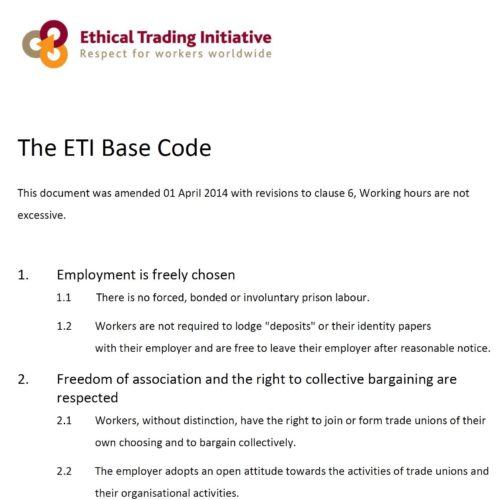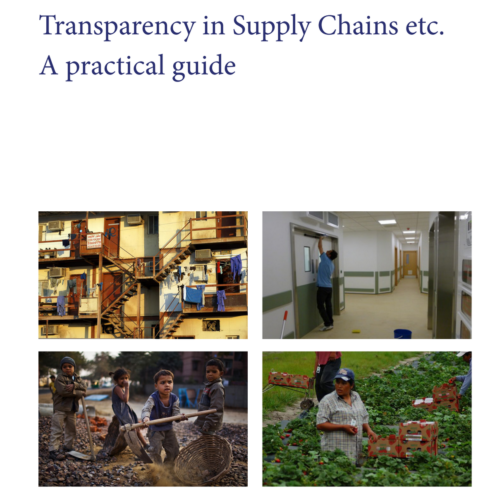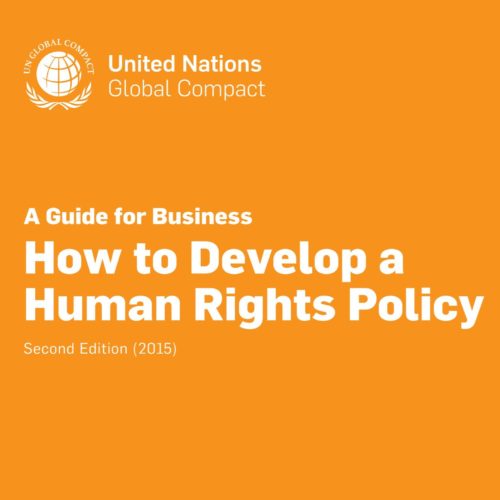-
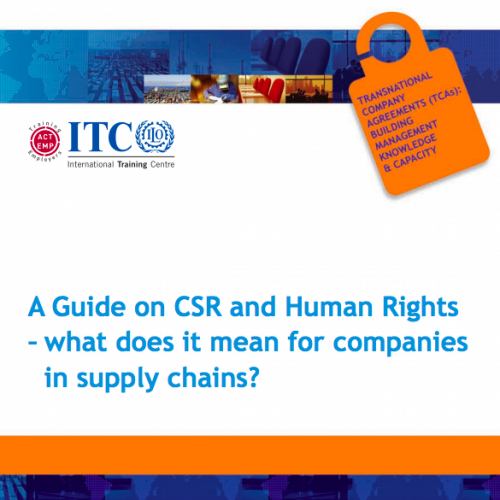 The Centre is the training arm of the ILO. This guidance is intended for small and medium-sized enterprises to understand, implement and adhere to the UN Guiding Principles on Business and Human Rights. It looks at the expectations placed on SMEs and buyers, the challenges they face and the support available for them.
The Centre is the training arm of the ILO. This guidance is intended for small and medium-sized enterprises to understand, implement and adhere to the UN Guiding Principles on Business and Human Rights. It looks at the expectations placed on SMEs and buyers, the challenges they face and the support available for them. -
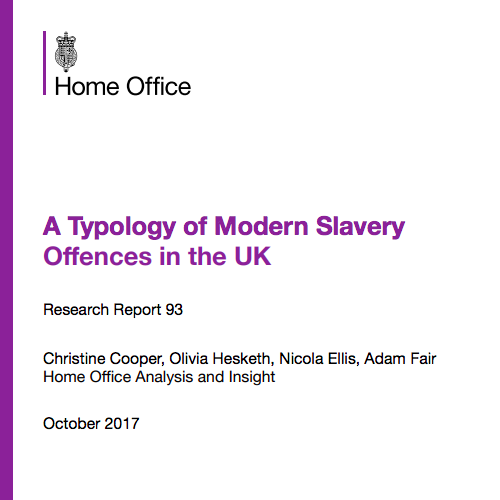 This report presents findings from research to create an evidence‐based typology of modern slavery offences in the UK. The research sought to devise a typology of modern slavery offences to improve the government's understanding of the different ways that modern slavery manifests in the UK and to inform tailored policy and operational responses. The typology, which is based on analysis on 328 confirmed cases of modern slavery in the UK, identifies 17 types of modern slavery offences setting out the characteristics of the victims, offenders and offences involved for each type.
This report presents findings from research to create an evidence‐based typology of modern slavery offences in the UK. The research sought to devise a typology of modern slavery offences to improve the government's understanding of the different ways that modern slavery manifests in the UK and to inform tailored policy and operational responses. The typology, which is based on analysis on 328 confirmed cases of modern slavery in the UK, identifies 17 types of modern slavery offences setting out the characteristics of the victims, offenders and offences involved for each type.Credit: Home Office
-
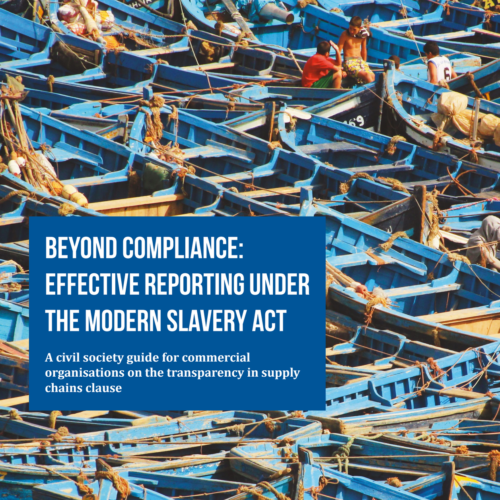 CORE is a civil society coalition on corporate accountability. This is a guide for commercial organisations on Section 54 of the Modern Slavery Act 2015, “Transparency in Supply Chains”. It is intended as a guide to understanding and addressing risks of modern slavery in supply chains, and provides guidance on producing, publishing and reviewing the annual slavery and human trafficking statement required of businesses.
CORE is a civil society coalition on corporate accountability. This is a guide for commercial organisations on Section 54 of the Modern Slavery Act 2015, “Transparency in Supply Chains”. It is intended as a guide to understanding and addressing risks of modern slavery in supply chains, and provides guidance on producing, publishing and reviewing the annual slavery and human trafficking statement required of businesses.Credit: CORE
-
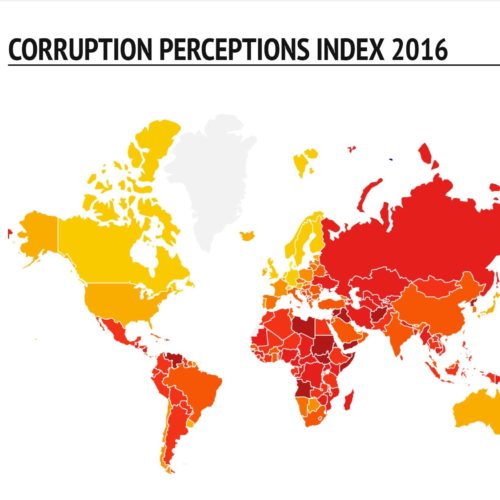 Transparency International (TI) works with governments, business and citizens to give voice to the victims and witnesses of corruption and stop the abuse of power, bribery and secret deals. TI has published the Corruption Perceptions Index since 1996, annually ranking countries by their perceived levels of corruption, as determined by expert assessments and opinion surveys. Over two-thirds of the 176 countries and territories in this year's Corruption Perceptions Index index fall below the midpoint of their scale of 0 (highly corrupt) to 100 (very clean).
Transparency International (TI) works with governments, business and citizens to give voice to the victims and witnesses of corruption and stop the abuse of power, bribery and secret deals. TI has published the Corruption Perceptions Index since 1996, annually ranking countries by their perceived levels of corruption, as determined by expert assessments and opinion surveys. Over two-thirds of the 176 countries and territories in this year's Corruption Perceptions Index index fall below the midpoint of their scale of 0 (highly corrupt) to 100 (very clean).Credit: Transparency International
-
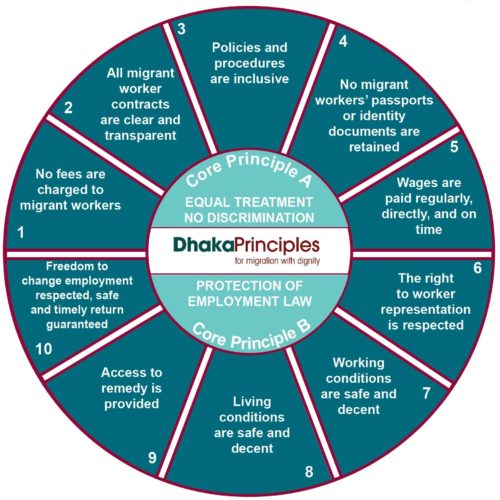 The Dhaka Principles provide a roadmap that traces a migrant worker from recruitment, through employment, to the end of contract. They provide key principles that employers and migrant recruiters should respect at each stage in the process to ensure migration with dignity.
The Dhaka Principles provide a roadmap that traces a migrant worker from recruitment, through employment, to the end of contract. They provide key principles that employers and migrant recruiters should respect at each stage in the process to ensure migration with dignity.Credit: Institute for Human Rights and Business
-
 The GLAA (formerly GLA) is a non-departmental public body in the United Kingdom regulating the supply of workers to the agricultural, horticultural and shellfish industries, and any associated processing and packaging industries. It has been granted police-style powers to investigate labour abuse and exploitation across all aspects of the UK labour market. Specific public authorities now have a duty to notify the Secretary of State of any person in England and Wales suspected of being a victim of human trafficking. Credit: Gangmasters and Labour Abuse Authority
The GLAA (formerly GLA) is a non-departmental public body in the United Kingdom regulating the supply of workers to the agricultural, horticultural and shellfish industries, and any associated processing and packaging industries. It has been granted police-style powers to investigate labour abuse and exploitation across all aspects of the UK labour market. Specific public authorities now have a duty to notify the Secretary of State of any person in England and Wales suspected of being a victim of human trafficking. Credit: Gangmasters and Labour Abuse Authority -
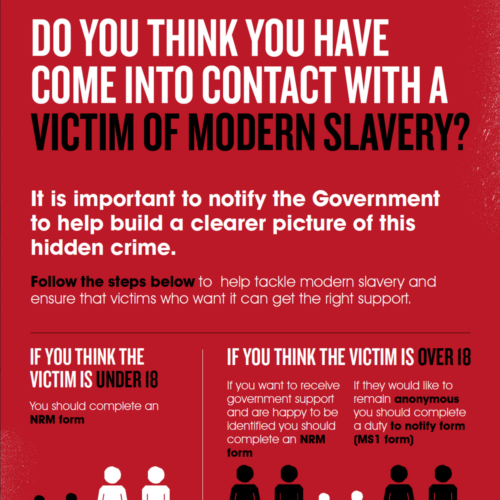 The GLAA (formerly GLA) is a non-departmental public body in the United Kingdom regulating the supply of workers to the agricultural, horticultural and shellfish industries, and any associated processing and packaging industries. It has been granted police-style powers to investigate labour abuse and exploitation across all aspects of the UK labour market. Specific public authorities now have a duty to notify the Secretary of State of any person in England and Wales suspected of being a victim of human trafficking. Credit: Gangmasters and Labour Abuse Authority
The GLAA (formerly GLA) is a non-departmental public body in the United Kingdom regulating the supply of workers to the agricultural, horticultural and shellfish industries, and any associated processing and packaging industries. It has been granted police-style powers to investigate labour abuse and exploitation across all aspects of the UK labour market. Specific public authorities now have a duty to notify the Secretary of State of any person in England and Wales suspected of being a victim of human trafficking. Credit: Gangmasters and Labour Abuse Authority -
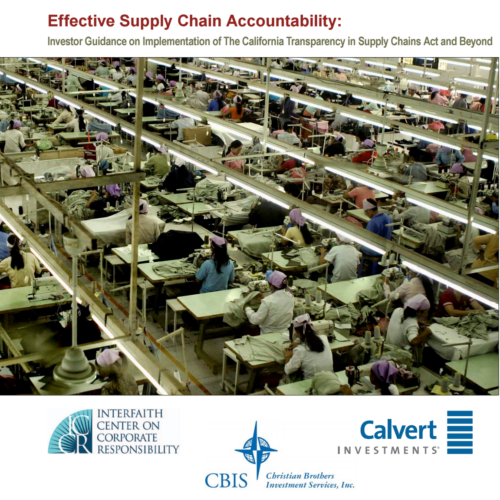 This guidance for investors outlines key steps relating to a company’s development of a specific anti-trafficking program, including elements the company should include in reports to demonstrate to stakeholders and shareholders that they are evaluating key risks in the supply chain and taking appropriate steps to address them. These include: - Develop and implement a human rights policy - Establish a human rights due diligence process - Conduct human rights risk assessments - Review, develop, and implement auditing, verification and traceability mechanisms - Train staff, suppliers, vendors, contractors, and auditors - Collaborate to expand efforts and influence - Produce a robust and substantive annual report
This guidance for investors outlines key steps relating to a company’s development of a specific anti-trafficking program, including elements the company should include in reports to demonstrate to stakeholders and shareholders that they are evaluating key risks in the supply chain and taking appropriate steps to address them. These include: - Develop and implement a human rights policy - Establish a human rights due diligence process - Conduct human rights risk assessments - Review, develop, and implement auditing, verification and traceability mechanisms - Train staff, suppliers, vendors, contractors, and auditors - Collaborate to expand efforts and influence - Produce a robust and substantive annual reportCredit: Interfaith Centre on Corporate Responsibility; Christian Brothers Investment Services; Calvert Investments.
-
 Stronger Together is a multi-stakeholder initiative which aims to reduce modern slavery. It provides guidance, training and resources to organisations, employers, labour providers, workers and their representatives. This free collection of resources includes pragmatic guidance and toolkits, and resources for the workplace including multilingual posters, leaflets and template policies. This guidance is intended for tenants renting home privately in the UK. It includes both obligations of the landlord and of tenants, and provides contact and advice helplines.
Stronger Together is a multi-stakeholder initiative which aims to reduce modern slavery. It provides guidance, training and resources to organisations, employers, labour providers, workers and their representatives. This free collection of resources includes pragmatic guidance and toolkits, and resources for the workplace including multilingual posters, leaflets and template policies. This guidance is intended for tenants renting home privately in the UK. It includes both obligations of the landlord and of tenants, and provides contact and advice helplines.Credit: Stronger Together
-
 Stronger Together is a multi-stakeholder initiative which aims to reduce modern slavery. It provides guidance, training and resources to organisations, employers, labour providers, workers and their representatives. This free collection of resources includes pragmatic guidance and toolkits, and resources for the workplace including multilingual posters, leaflets and template policies. These seven principles have been agreed upon by the supermarket businesses sponsored by Stronger Together. The list includes "common principles" for the businesses' supply chains partners to follow when completing modern slavery statements.
Stronger Together is a multi-stakeholder initiative which aims to reduce modern slavery. It provides guidance, training and resources to organisations, employers, labour providers, workers and their representatives. This free collection of resources includes pragmatic guidance and toolkits, and resources for the workplace including multilingual posters, leaflets and template policies. These seven principles have been agreed upon by the supermarket businesses sponsored by Stronger Together. The list includes "common principles" for the businesses' supply chains partners to follow when completing modern slavery statements.Credit: Stronger Together
-
 This is an analysis of modern slavery statements that focuses on changes in reporting and practice in addressing forced labour and human trafficking. It covers 150 sample companies across different sectors. It seeks to understand the quality and scope of reporting against the UK Modern Slavery Act’s transparency requirements set out in s. 54 as well as the accompanying guidance on recommended content published by the Home Office.
This is an analysis of modern slavery statements that focuses on changes in reporting and practice in addressing forced labour and human trafficking. It covers 150 sample companies across different sectors. It seeks to understand the quality and scope of reporting against the UK Modern Slavery Act’s transparency requirements set out in s. 54 as well as the accompanying guidance on recommended content published by the Home Office.Credit: Ergon Associates
-
 The ILO is a UN organisation responsible for setting and monitoring international labour standards. This ILO paper includes an introduction and background to the context of labour recruitment in a period of increased global mobility, and details existing international and national labour standards to regulate recruitment of workers. It includes examples from the UK.
The ILO is a UN organisation responsible for setting and monitoring international labour standards. This ILO paper includes an introduction and background to the context of labour recruitment in a period of increased global mobility, and details existing international and national labour standards to regulate recruitment of workers. It includes examples from the UK.Credit: International Labour Organisation (ILO)
-
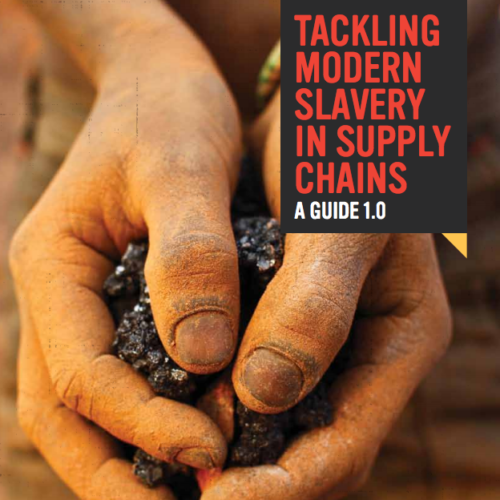 The Walkfree Foundation was established by Andrew Forrest, the Chairman of Fortescue Metals Group, after he found labour exploitation within his own supply chains and took a number of steps to prevent modern slavery affecting his business. This comprehensive guide considers corporate policy on modern slavery and provides both guidance and tools to implement it. It includes advice on corporate policy and provides template examples of a number of tools. Credit: Walkfree Foundation & Verite
The Walkfree Foundation was established by Andrew Forrest, the Chairman of Fortescue Metals Group, after he found labour exploitation within his own supply chains and took a number of steps to prevent modern slavery affecting his business. This comprehensive guide considers corporate policy on modern slavery and provides both guidance and tools to implement it. It includes advice on corporate policy and provides template examples of a number of tools. Credit: Walkfree Foundation & Verite

